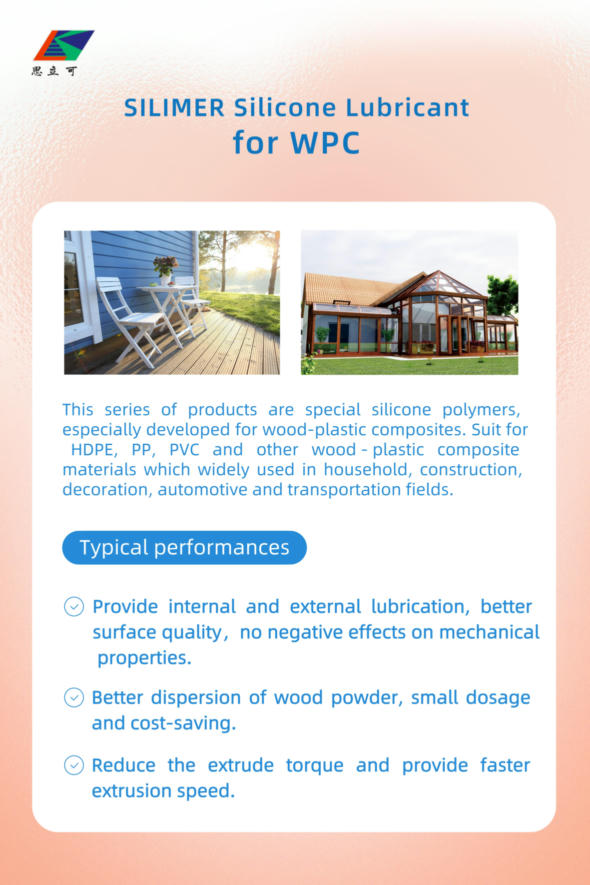Innovative Wood Plastic Composite Solutions: Lubricants in WPC
Wood plastic composite (WPC) is a composite material made of plastic as a matrix and wood as filler, In WPC production and processing the most critical areas of additive selection for WPCs are coupling agents, lubricants, and colorants, with chemical foaming agents and biocides not far behind.
Usually, the addition of wood-plastic lubricants improves the processability of wood-plastic materials, reduces the coefficient of friction, prevents thermal decomposition and degradation, and improves the surface quality of the product. These effects make the wood-plastic products more stable and efficient during production and use. But there are many types of wood plastic lubricants on the market today, how should we choose?
Common Types of Lubricants in WPC Production:
1. Polyethylene wax (PE wax) lubricant:
Advantage: It has good lubricating properties and the effect of reducing the coefficient of friction, and can improve the processing performance and surface finish of wood-plastic materials.
Disadvantages: easy to melt under high temperature, not suitable for high-temperature environment.
2. Polyethylene oxide (POE) lubricant:
Advantages: excellent low-temperature performance and lubrication effect, can improve the processing performance of wood-plastic materials, improve molding efficiency.
Disadvantages: easy to absorb moisture, not suitable for high humidity environment of wood plastic production.
3. Polymer lubricant:
Advantages: better temperature resistance, can maintain a more stable lubrication effect in the high-temperature environments, improved the processing performance of wood-plastic materials.
Disadvantages: high price, relatively high cost of use.
4. Silicone lubricant:
Advantages: excellent temperature resistance and good lubrication effect, can reduce the surface tension and viscosity of wood-plastic materials, increase the fluidity of the material, and reduce the coefficient of friction.
Disadvantages: some wood-plastic materials will have compatibility problems, and need to choose the appropriate silicone lubricant according to the specific circumstances.
5. Composite lubricants:
Advantages: composite of different types of lubricants, can be integrated to play their respective advantages and improve the processing performance and surface quality of wood-plastic materials.
Disadvantages: composite lubricant formula design and debugging are relatively complex, and need to be adjusted according to specific requirements.
Different types of wood-plastic lubricants have their own advantages and disadvantages, the specific choice should be based on the production requirements, material properties, and cost, and other aspects of comprehensive consideration.
Innovative Wood–plastic Composite Solutions: SILIKE Lubricants Redefining WPC Solutions:
In order to solve the difficulties in processing wood-plastic composites, SILIKE has developed a series of high-efficiency lubricants for wood-plastic composites(WPCs)
Lubricant Additive (Processing Aids) For WPC, SILIKE SILIMER 5400, is specially developed for the processing and production of PE and PP WPC (wood plastic materials) such as WPC decking, WPC fences, and other WPC composites, etc. A small dosage of this SILIMER 5400 Lubricant Additive can significantly improve the processing properties and surface quality, including reducing the COF, lower extruder torque, higher extrusion-line speed, durable scratch & abrasion resistance, and excellent surface finish with a good hand feel.
The core component of this WPCs Lubricant is modified polysiloxane, containing polar active groups, excellent compatibility with resin and wood powder, in the process of processing and production can improve the dispersion of wood powder, does not affect the compatibility effect of compatibilizers in the system, can effectively improve the mechanical properties of the product.
Silike Technology has been committed to offering easy, time-saving, and money-saving one-stop solutions and purchasing services for WPCs manufacturers, an Alternative to the Struktol Tpw series -WPCs Additive.
Throw away your old processing lubricant WPCs additive, here you need to know Processing Lubricant WPCs Additive Manufacturer!
Post time: Sep-26-2023






